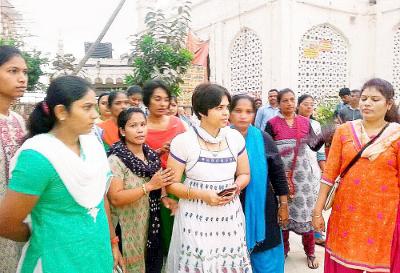Mumbai, Aug 28: Two days after Bombay High Court lifted the ban on women's entry in Haji Ali Dargah, Bhumata Brigade activist Trupti Desai today visited the shrine and offered a 'chadar', while announcing that her next crusade for women's right to pray would be Kerala's Sabarimala temple.
 "Last time, when we came here at Haji Ali Dargah, we prayed for the verdict of the high court on our side. Since our prayer was heard and fulfilled, we came here to seek the blessings of Haji Ali Baba and offered him a 'chadar'," Desai told reporters outside the shrine, located on an islet off the coast of Worli in Mumbai.
"Last time, when we came here at Haji Ali Dargah, we prayed for the verdict of the high court on our side. Since our prayer was heard and fulfilled, we came here to seek the blessings of Haji Ali Baba and offered him a 'chadar'," Desai told reporters outside the shrine, located on an islet off the coast of Worli in Mumbai.
One of the most recognisable landmarks of the city, the Indo-Islamic architectural structure contains the tomb of Sayed Peer Haji Ali Shah Bukhari.
Thanking the people of the country, including Muslims, for their support, Desai requested the Dargah's trust to not move the Supreme Court against the HC's judgement, but exuded confidence that the apex court would rule in women's favour if such a step was taken.
"I request the trustees with folded hands to follow the verdict of the high court and not go to the Supreme Court to challenge the order as this was in favour of the all the women in the country.
"If the trustees prefer to knock on the Supreme Court's door, then nothing is going to change because the apex court too would uphold the constitutional right of the women and I am fully confident about it," she said.
"If the trustees give a serious thought over the merits of the high court's verdict, then it is possible that the doors of Baba can be opened in next two days only for the women devotees," said the womens' right activist.
The activist also said that she wanted to meet the trustees today, but no one was available since it was a Sunday.
In a landmark judgement, the Bombay High Court had on Friday lifted the ban imposed on women from entering the sanctum sanctorum of Haji Ali Dargah here, saying it contravenes fundamental rights and that the trust has no right to prohibit women's entry into a public place of worship.
The court, however, stayed its order for six weeks following a plea by Haji Ali Dargah Trust, which wants to challenge it in the Supreme Court. In April this year, Desai had unsuccessfully tried to enter the sanctum sanctorum of the Haji Ali Dargah.
"Today I went only upto the permissible limit of the Dargah, as I did not want to flout the court's ruling in any case," Desai said, adding that she had no intention to hurt the religious sentiments of anyone but was only trying to make sure that women are given equal rights to pray in all places of worship.
When asked what would be her next destination in her quest for women's right to pray, Desai said, "I think that in the backdrop of the high court's verdict, the trustees of the Sabarimala temple ought to open their doors for women discriminated on the basis of gender."
"And if they don't, then I would launch a similar agitation and would speak to the management of the temple in next few days," she said.
The Haji Ali Dargah Trust had in 2012 imposed the ban on women's entry citing religious traditions.
The Maharashtra government had earlier told the HC that women should be barred from entering the inner sanctorum of Haji Ali dargah only if it is so enshrined in the Quran.
The ban on women's entry cannot be justified if it is on the basis of an expert's interpretation of the Quran, the then Maharashtra Advocate General Shrihari Aney had argued.
The Dargah trust had defended its stand saying that it is referred in Quran that allowing women close proximity to the dargah of a male saint is a grievous sin.
Earlier this year, the Bhumata Brigade led by Desai had managed to win their fight for women's right to pray at the famous Shani Shingnapur temple in Ahmednagar district and Trimbakeshwar temple in Nashik district.
















Comments
@rikaz, not only women... men also prohibited to these idolatry actions
Allah forgive us all for these kind of shirks.....women are not allowed at all....you cannot ask for help from anyone but Allah...
Add new comment